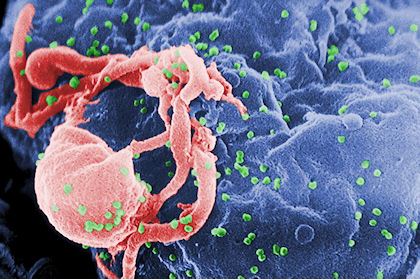
Many of the residents in the St Francis Hospice came to the shelter because they have a virus called FIV (Feline Immunodeficiency Virus). Due to the nature of the virus many rescue organizations find it difficult to house and re-home cats with this condition. St Francis Hospice acts as a last resort for so many cats with this condition that would otherwise be euthanized.
FIV belongs to the same group as Human Immunodeficiency Virus (HIV) and for this reason has received much greater attention than it would otherwise have done. Initial panic ensued after the virus was discovered in 1986 and many thousands of cats were euthanized. Attitudes are changing and less FIV+ cats are now being killed, although it does still happen.
Please take this opportunity to learn or refresh your knowledge about FIV. The more we can increase awareness of the virus, the fewer cats are likely to be euthanized as a result.

The virus depletes the number of white blood cells, which eventually makes the cat less able to fight off infection. However, because it is such a slow acting virus many FIV+ cats can enjoy a normal life span with no apparent health problems resulting from the virus.
FIV is specific, so can only be transmitted from cat to cat, and not to humans or to other animals.
The virus is present in the blood and saliva of infected cats. It is a very ‘fragile’ virus that cannot survive for long outside the body and requires a high dose to infect another cat. Therefore, it is not easily passed from cat to cat.
The main route of infection is through biting, when virus in the saliva of an infected cat is injected directly into the blood stream of the cat it bites. Therefore, cats that fight are most likely to be infected. Un-neutered males are most at risk due to their propensity to fight.
Transmission between cats in a group that do not fight is unlikely as the virus cannot be transmitted indirectly, such as via food bowls or clothes. Recent research suggests the transfer rate between cats in the same household is as low as 1-2%.
In theory the depletion of white blood cells, makes the cat more susceptible to other infections, and makes it more difficult for the cat to overcome them. However, in practice many FIV+ cats have no more infections than uninfected cats.
The commonest infection to occur in FIV + cats is gingivitis and stomatitis (inflammation of the gums and other parts of the mouth). Various other chronic infections may also occur although are less common e.g. conjunctivitis and diarrhea. Treatments are available for these infections.
A fourteen year study by Maureen Hutchison B.Sc, BVMS, MRCVS found that FIV+ cats are more likely to die in a road accident or be alive and well in their later life than they are to die from any FIV related condition. Also, a recent survey by Dr Diane D. Addie (Lecturer in Veterinary Virology, University of Glasgow) where 26 cats were monitored for ten years, found that FIV infection did not affect the cats’ life expectancy.
The most effective way of reducing the likelihood of infection is to ensure your cat is neutered. As well as being the most humane way of reducing the future stray population, neutering reduces the tendency to fight, or to wander.
FIV positive cats find it harder than most to find new homes, even though in all other respects they are normal, loving cats, and deserve a chance at a happy life.
A healthy FIV+ cat can live for many years, and indeed can often outlive uninfected cats. However please be aware that this is not always the case. The cat may succumb to illness earlier, and not reach their normal life expectancy. FIV+ cats need prompt veterinary assistance for even minor symptoms due to their reduced immunity.
Many rescues insist that FIV cats are homed as ‘indoor cats’ or go to homes with an enclosed garden to prevent contact with other cats. If you think you might be able to give a home to an FIV cat, please ask at your local rescue centre.
Once established in a cat’s cells, the virus is permanent, and no proven vaccine has yet been found. Treatment consists of dealing with whatever symptoms occur in the individual cat, such as common infections being treated with Antibiotics. If an FIV+ cat displays any symptoms of illness, however minor, it should be taken to a vet promptly.
